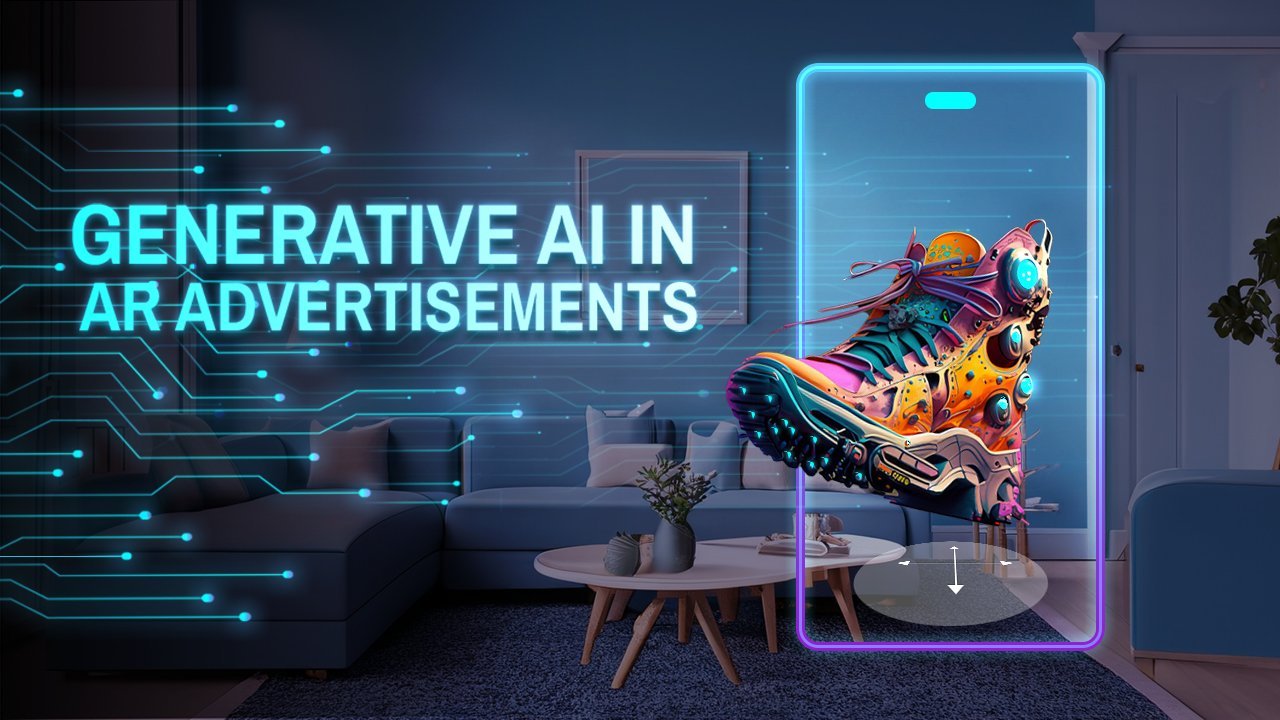The Rise of Generative AI in AR Advertising
- 1 What is Generative AI?
- 2 How is Generative AI used in AR Advertising?
- 2.1 I. The Marriage of AR and Generative AI
- 2.2 II. Personalized Experiences
- 2.3 III. Enhanced Engagement
- 2.4 IV. Real-time Content Generation
- 2.5 V. User-Generated Content
- 2.6 VI. Challenges and Considerations
- 2.7 Why is Generative AI ideal for AR Advertising?
- 2.8 What’s the future of Generative AI in AR Advertising?
- 3 Conclusion:
Over the last few years, augmented reality (AR) has rapidly emerged as one of the most exciting and disruptive technologies for advertisers and marketers. It offers new ways to engage with consumers and impacts the way they interact with products and services. AR Advertising is not new, but AR Advertising enhanced with Generative AI is a game-changer.
It helps marketers create highly personalized and hyper-targeted ad experiences that can capture the audience’s attention even before they become aware of it. In this blog post, we will explore how Generative AI in AR Advertising is changing the game for brands.
What is Generative AI?
Generative AI is an advanced form of artificial intelligence that creates new data, ideas, and content from scratch, unlike traditional AI which can only mimic existing patterns or data. In AR Advertising, Generative AI can be used to create unique and personalized AR experiences for each individual user. Instead of creating a single AR experience that is replicated across multiple users or campaigns, Generative AI creates new and custom experiences that are tailored to each user’s preferences or behavior.
How is Generative AI used in AR Advertising?
Generative AI-powered AR Advertising is still in its early stages, but some companies are already demonstrating the power of this combination. For example, McDonald’s created an AR game in which users could customize their own burgers using their smartphones. The generative AI algorithm analyzed the user’s preferences and created customized burger recipes. Similarly, Coca-Cola used generative AI to create personalized vending machines that generated unique AR experiences for each user, right in front of the machine.
I. The Marriage of AR and Generative AI
- AR Advertising: A Brief Overview Augmented Reality enhances the real world with digital overlays. In AR advertising, this means delivering interactive and immersive content to consumers through their smartphones, tablets, or AR glasses. This technology enables brands to provide engaging and memorable experiences that resonate with customers.
- Generative AI: Unleashing Creativity Generative AI refers to AI systems that can generate content, such as text, images, or even 3D models, with minimal human intervention. It is powered by deep learning models, like GPT-3, and is capable of producing highly realistic and contextually relevant content. This opens up new dimensions of creativity in AR advertising.
II. Personalized Experiences
- Tailored Ad Campaigns Generative AI in AR advertising allows for the creation of personalized, context-aware ads. By analyzing user data, AI can craft AR experiences that cater to individual preferences and behavior, making each encounter feel unique and relevant.
- Dynamic Product Placement With Generative AI, advertisers can dynamically insert products or advertisements into a user’s AR environment. This means users can view products in their surroundings, try them out virtually, and make informed decisions before purchasing.
III. Enhanced Engagement
- Interactive Storytelling Generative AI makes it possible to create interactive AR narratives that adapt based on user interactions. Users become part of the story, and their choices influence the unfolding narrative, leading to increased engagement.
- Gamification Gamifying AR ads through Generative AI turns marketing campaigns into playful experiences. Brands can build challenges, scavenger hunts, and rewards, driving user participation and retention.
IV. Real-time Content Generation
- Rapid A/B Testing Generative AI enables advertisers to test different AR ad versions rapidly. AI-generated content can be A/B tested in real-time, allowing brands to optimize campaigns and maximize their impact.
- Contextual Content AI can analyze the user’s environment in real time, adjusting the AR content to match the surroundings. This ensures that advertisements seamlessly blend into the user’s world, enhancing the user experience.
V. User-Generated Content
- Social Media Integration Generative AI-powered AR ads often encourage users to create and share their content. This user-generated content can go viral on social media, amplifying the reach and impact of the advertising campaign.
- Building Brand Advocates When users engage with AR ads and create their content, they develop a stronger emotional connection to the brand. This can foster brand loyalty and turn users into advocates who promote the brand to their social circles.
VI. Challenges and Considerations
- Privacy Concerns Collecting user data for personalization can raise privacy issues. Advertisers must be transparent about data usage and ensure compliance with privacy regulations like GDPR and CCPA.
- Integration Complexity Combining Generative AI and AR requires technical expertise. Advertisers need to work with developers who understand both technologies to create seamless and effective campaigns.
Why is Generative AI ideal for AR Advertising?
The main benefit of generative AI in AR Advertising is its ability to create tailored and unique experiences for each user, creating more engagement and brand loyalty. Generative AI analyzes user data, behavior, and preferences to create highly personalized ad experiences that are more likely to stick with consumers. Moreover, the generative nature of AI creates endless possibilities for marketers to create new and unique AR experiences that can help build brand awareness, loyalty, and credibility.
What’s the future of Generative AI in AR Advertising?
Generative AI in AR Advertising is just getting started, and we can expect more innovation and disruption in this space in the coming years. As AR technology continues to evolve, Generative AI algorithms will become more sophisticated and capable of creating even more personalized and engaging AR experiences. We can also expect more brands and marketers to adopt this approach to advertising, driven by the significant benefits it offers in terms of engagement, attention, and conversion rates.
Conclusion:
In conclusion, Generative AI in AR Advertising is a transformative technology that is redefining the way brands interact and engage with their customers. It offers limitless possibilities for creating hyper-personalized and engaging AR experiences that can build brand awareness, loyalty, and customer satisfaction. As AR continues to grow in popularity, and Generative AI becomes more advanced, we are sure to see even more exciting and creative applications of this technology in advertising and marketing. For brands that want to stay ahead of the curve, investing in AR Advertising enhanced with Generative AI is a must.


















For more Details Visit us Xarwin